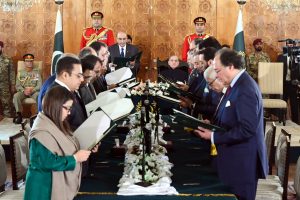Pakistan’s new federal cabinet, which was announced recently, is made up of technocrats, seasoned politicians, and a few new names of people who are not affiliated with any political party. The new cabinet appears to be the outcome of a compromise reached by key stakeholders, including the military, and political parties in power to find a way to get Pakistan out of the volatile post-election period that was tainted by allegations of electoral manipulation.
The federal cabinet’s formation suggests that there was significantly more to the election-rigging controversy than was previously thought. It wasn’t a simple case of votes being stuffed in favor of one side. Instead, the alleged manipulation effort was aimed at assisting Pakistan’s influential institutions to sideline some members of the newly-elected ruling coalition from gaining influence over the new administration.
Thus, although the Pakistan Muslim League-Nawaz (PML-N) emerged as the front-runner in terms of seats in the National Assembly, some within the party feel that the PML-N’s founder, Nawaz Sharif, was set up to lose, allowing his younger brother Shehbaz Sharif and his group to gain strength at the federal level.
The composition of the new cabinet makes it very clear that not even a handful of Nawaz’s supporters hold significant positions in the administration. For example, former Finance Minister Ishaq Dar, a close ally of Nawaz, has not returned to assume leadership of the ministry. As I noted in a previous piece, Dar was unlikely to be put in charge of the finance ministry. Crucial discussions between Pakistan and the International Monetary Fund (IMF) about a new loan arrangement are imminent, and the Fund is reportedly not comfortable engaging with him because of his purported inefficiency in negotiations. In addition, he may also have lost the portfolio due to his close ties with Nawaz.
Instead, Muhammad Aurangzeb, a renowned banker, has been assigned the role of finance minister along with overseeing the revenue portfolio. Since Aurangzeb is not a member of any political party and has not been elected to the legislature, it is possible that the military leadership recommended his appointment.
The foreign ministry has been assigned to Dar. He won’t be able to operate independently even there, though, for two reasons. First is that foreign policy is the area in which the security establishment interacts most closely with any government. The security establishment is involved in all important decisions made at the ministry. Second, Dar won’t have much room to influence anything other than implementing the Foreign Office’s recommendations because he will have to collaborate with advisers who work more closely with the establishment than the elected government,
In a similar vein, Nawaz’s reliable internal security aide Rana Sanaullah, who oversaw the PML-N’s interior ministry in the past, has been kept out of the cabinet, and the interior ministry has been assigned to Mohsin Raza Naqvi, the outgoing interim chief minister of Punjab. Being closer to the military establishment, Naqvi appears to have been appointed to the position at the military’s request to oversee law and order in accordance with the demands of the security establishment.
In another crucial appointment, Aleem Khan, the leader of the Istehkam-e-Pakistan Party (IPP), has been assigned the vital privatization ministry. A Board of Investment portfolio has also been allocated to him. Khan’s portfolio is all the more important in light of Pakistan’s desire to collaborate with the IMF to privatize state-owned businesses that are heavily in debt.
In order to effectively manage affairs at the Board of Investment, Khan will need to work closely with the Special Investment Facilitation Council (SIFC), a body that is currently in charge of leading initiatives to attract foreign investments and boost the nation’s economic growth. The army chief is legally permitted to have a seat on the SIFC, which is organized by the armed forces. Khan’s appointment to the position is yet another indication that the establishment has ensured that privatization is led by a person it deems reliable, with no affiliations to the PML-N or other political parties.
In the same vein, Prime Minister Shehbaz Sharif is seen as the main point person to maintain strong relations with the military establishment. It was during his previous rule as premier that he advocated the concept of establishing the SIFC and giving the military constitutional authority to influence it. This essentially means that the premier has been receptive to the influential institution’s advice on crucial aspects of cabinet formation and is likely to continue in that route going forward.
Overall, the cabinet shows that the military has been successful in placing its reliable people in important posts while assigning others to less significant ones. It is reasonable to wonder in this situation how much leeway the premier will have to decide independently on important matters of governance and policy.
The military’s backing for the cabinet’s composition sends a strong message that any attempts by the political opposition to undermine the new government will be met with force. Seemingly, the prime minister and other lawmakers will not stand in the way of the cabinet’s advancement of reforms, and it will engage with the international community with authority.
How successful this formula will be in light of the challenging economic conditions and developing political challenges remains to be seen.

































